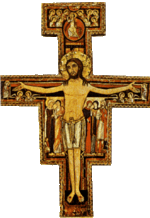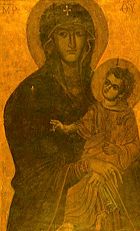Pope Benedict XIV
| Benedict XIV[1] | |
 |
|
| Papacy began | August 17, 1740 |
|---|---|
| Papacy ended | May 3, 1758 |
| Predecessor | Clement XII |
| Successor | Clement XIII |
| Birth name | Prospero Lorenzo Lambertini |
| Born | March 31, 1675 Bologna, Italy |
| Died | May 3, 1758 (aged 83) Rome, Italy |
| Other popes named Benedict | |
Pope Benedict XIV (March 31, 1675 – May 3, 1758), born Prospero Lorenzo Lambertini, was Pope from August 17 1740 to 3 May 1758.
Contents |
Biography
He was born into a noble family of Bologna, which was at that time the second largest city in the Papal States. He was elected Pope in 1740. The conclave which elected him had lasted six months; he is alleged to have said to the cardinals: "If you wish to elect a saint, choose Gotti; a statesman, Aldrovandi; a donkey, elect me" (in Italy the donkey symbolizes ignorance). His Papacy began in a time of great difficulties, chiefly caused by the disputes between Catholic rulers and the Papacy about governmental demands to nominate bishops rather than leaving the appointment to the Church. He managed to overcome most of these problems — the Holy See's disputes with the Kingdom of Naples, Sardinia, Spain, Venice, and Austria were settled.

He had a very active papacy, reforming the education of priests, the calendar of feasts of the Church, and many papal institutions. Perhaps the most important act of Benedict XIV's pontificate was the promulgation of his famous laws about missions in the two bulls, Ex quo singulari and Omnium solicitudinum. In these bulls he ruled on the custom of accommodating Christian words and usages to express non-Christian ideas and practices of the native cultures, which had been extensively done by the Jesuits in their Indian and Chinese missions. An example of this is the statues of ancestors - there had long been uncertainty whether honor paid to one's ancestors was unacceptable 'ancestor worship,' or if it was something more like the Catholic veneration of the saints. This question was especially pressing in the case of an ancestor known not to have been a Christian. The choice of a Chinese translation for the name of God had also been debated since the early 17th century. Benedict XIV denounced these practices in these two bulls. The consequence of this was that many of these converts left the Church.

On December 22, 1741, Benedict XIV promulgated the papal bull "Immensa Pastorum principis" against the enslavement of the indigenous peoples of the Americas and other countries.
Benedict XIV was also responsible, along with Cardinal Passionei, for beginning the catalogue of the Vatican Library.
Footnotes
- ↑ Pope Benedict X is now considered an antipope. At the time, however, this status was not recognized and so the man the Roman Catholic church officially considers the tenth true Pope Benedict took the official number XI, rather than X. This has advanced the numbering of all subsequent Popes Benedict by one. Popes Benedict XI-XVI are, from an official point of view, the tenth through fifteenth popes by that name.
See also
- Chinese Rites controversy
- Suppression of the Jesuits
- Castrato - Benedict XIV was one of the first Popes to voice displeasure regarding the use of castrated males in Church choir services.
- Vix Pervenit
External links
 "Pope Benedict XIV" in the 1913 Catholic Encyclopedia.
"Pope Benedict XIV" in the 1913 Catholic Encyclopedia.- Pope Benedict XIV Portrait at the Vatican Museum.
| Roman Catholic Church titles | ||
|---|---|---|
| Preceded by Jacopo Cardinal Boncompagni |
Archbishop of Bologna 1731–1740 |
Succeeded by Vincenzo Malvezzi |
| Preceded by Clement XII |
Pope 1740–1758 |
Succeeded by Clement XIII |
|
||||||||||||||||
|
|||||||||||||||||||||||||||||||||||||||||||||
|
|||||||||||||||||||||||||||||||||||||||||||||

